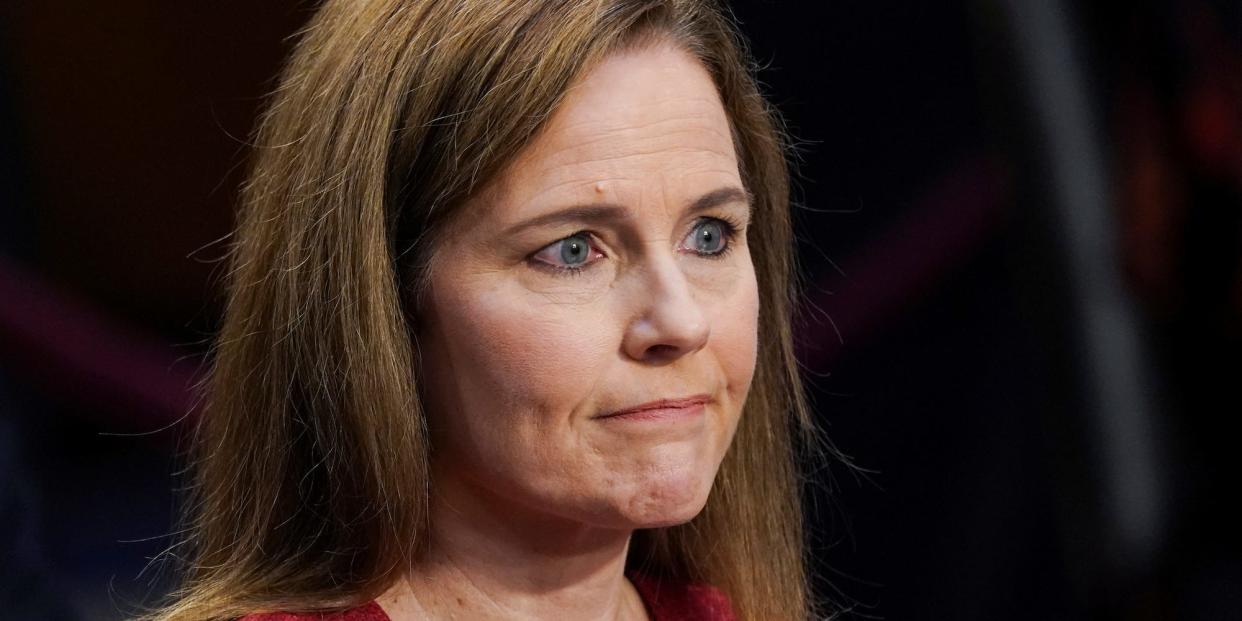Amy Coney Barrett was on the board of a private Christian school that once tried to ban children of same-sex parents

Amy Coney Barrett was on the board of trustees for Trinity School Inc. from 2015 to 2017.
The school, which has campuses in Indiana, Minnesota, and Virginia, is part of People of Praise, a religious group Barrett is a member of.
In interviews with Associated Press, former People of Praise members, as well as former students and employees of Trinity School Inc, said the organization discriminated against the LGBTQ community.
In 2014, the school only allowed children to be admitted if they were the child of a single parent or a legally married couple — during a time when same-sex marriage wasn't yet legalized nationally.
Supreme Court nominee Amy Coney Barrett was once on the board of trustees for a private Christian school that discriminated against the LGBTQ community, according to a report from the Associated Press.
Barrett was on the board of trustees for Trinity School Inc, which operates three sixth-to-12th-grade schools in Indiana, Minnesota, and Virginia, from 2015 to 2017.
The school is affiliated with People of Praise, a mostly Christian multi-denominational religious group Barrett is a member of, which has faced criticism for its treatment of women and the LGBTQ community.
In interviews with the AP, former People of Praise members, as well as former students and employees of Trinity School Inc., said that the schools "effectively barred admission to children of same-sex parents and made it plain that openly gay and lesbian teachers weren't welcome in the classroom."
A parent handbook from the Trinity School in Indiana, where at least three of Barrett's children took classes, features anti-LGBTQ rhetoric, including a section that says the school's core beliefs partly consist of a Christian understanding that marriage is only "between a man and a woman."
The school had only allowed students to be admitted if they were the child of a same-sex couple
In 2014, according to the AP, Trinity's trustees voted to only allow children to be admitted if they were the child of a single parent or a legally married couple.
The ruling made it nearly impossible for children of same-sex parents to attend the school, as same-sex marriages were illegal at the time in Indiana and Virginia, and the Supreme Court had not yet nationally legalized same-sex marriage.

"The reason was not any desire to judge or punish, but to avoid potential confusion for our students regarding our consistent position that sexual activity is meant to be only within marriage, understood as the union of one man and one woman," Jon Balsbaugh, president of Trinity Schools Inc, told the AP.
During her Senate confirmation hearing last week, Barrett refused to say whether she agreed with the Supreme Court's landmark ruling that legalized same-sex marriage nationally in 2015.
In another section of Trinity's handbook, the school said students with same-sex attraction urges should not "prematurely interpret any particular emotional experience as identity-defining" or "openly discuss matters of personal sexuality."
"We believe that such self-identification at a young age can lead to students being labeled based solely upon sexuality, generate distraction, create confusion, and prevent students from experiencing true freedom within the culture of the school," the school policy said.
Former students, employees, and People of Praise members said anti-LGBTQ rhetoric was regularly used at Trinity
Interviewees in AP's report said Trinity's leadership voiced anti-LGBTQ rhetoric in enrollment and employment agreements, as well as one-on-one conversations, and told AP that they were "terrified" and "petrified" at the thought of Barrett joining the Supreme Court.
Trinity Schools did not immediately respond to Insider's request for comment.
Balsbaugh told AP: "Trinity Schools does not unlawfully discriminate with respect to race, color, gender, national origin, age, disability, or other legally protected classifications under applicable law, with respect to the administration of its programs."
Read the full report at the Associated Press»
Read more:
Experts say Amy Coney Barrett's nomination could threaten IVF. Here's why.
Delaware senator says he's 'not a fan' but is open to adding justices to Supreme Court
Read the original article on Business Insider


